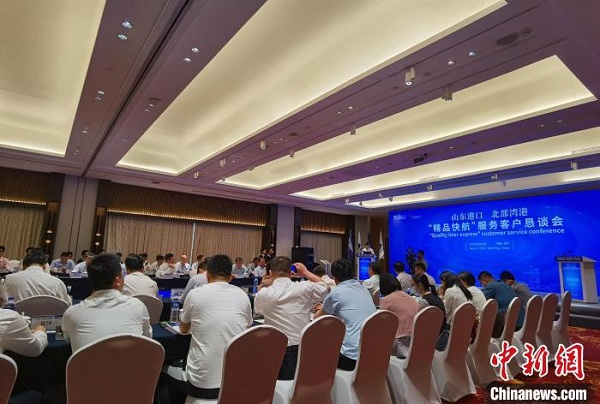Beibu Gulf cooperates with Shandong ports for business boost

Beibu Gulf Group and Shandong Port Group hold a customer services conference on the quality liner express to be launched. [Photo by Yang Chen/China News Service]
Beibu Gulf Port Group and two ports in Shandong province, namely Qingdao Port and Rizhao Port, signed a strategic cooperation framework agreement in Nanning, capital of Guangxi Zhuang autonomous region, on May 23.
It is expected that business cooperation work between the ports of both the Beibu Gulf and Shandong will be progressed, and convenient transport and trade channels will be built to boost regional economic development.
Beibu Gulf Group was set up in February 2007 following the integration of Fangcheng Port, Qinzhou Port and Beihai Port, while Shandong Port Group contains Qingdao Port, Rizhao Port, Yantai Port and Bohai Port, and is now the largest port operator around the world.
Li Yanqiang, chairman of Beibu Gulf Port Group, said that Beibu Gulf ports have maintained close relationships with Shandong Port Group. The two groups jointly handled a total bulk throughput of around 3 million metric tons in 2020. A total of three direct shipping lines had been put into operation between the two areas by mid-May.
The agreement says that the density of shipping routes running between the two areas will be further increased to meet up with business demand, and a high-quality liner express will be released.
The opportunities for developing foreign trade from both Beibu Gulf ports and Shandong ports will be fully optimized, as they are close to ASEAN and northeast Asia respectively.
Beibu Gulf New Materials is a major stainless steel manufacturer in South China. A total of 80 percent of its fuel, such as coke and anthracite, are transported from major ports in Shandong province.
Pan Liaoting, general manager of Beibu Gulf New Materials, said that the high-quality liner express between the two areas could save more than 10 billion yuan ($1.6 billion) in comprehensive logistics for the company and increase transport efficiency by more than 10 percent.














